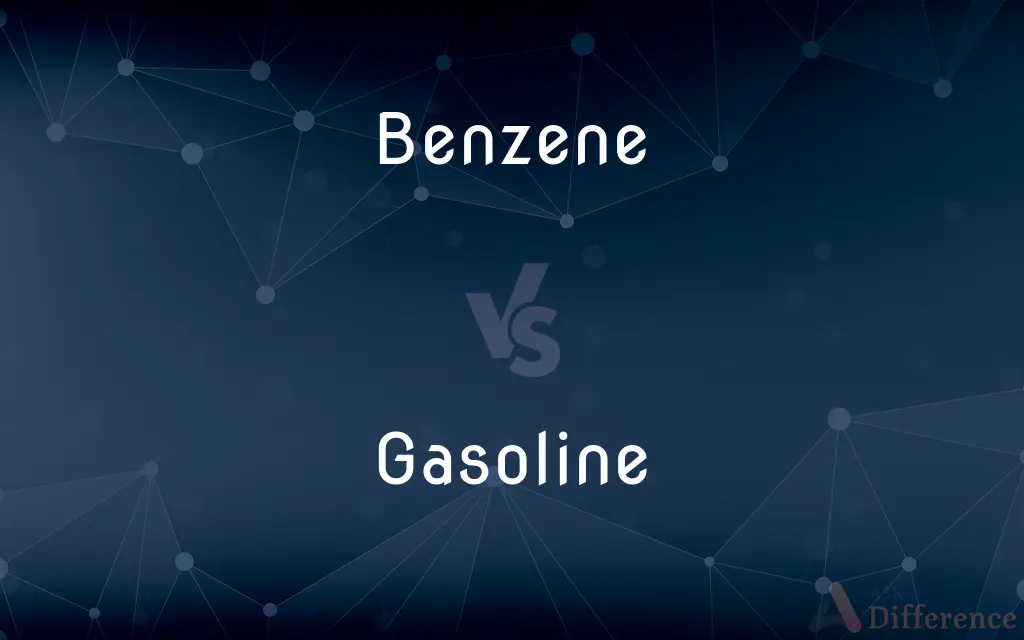Benzene vs. Gasoline — What's the Difference?
Edited by Tayyaba Rehman — By Fiza Rafique — Updated on September 25, 2023
Benzene is a chemical compound (C6H6) with a ring of six carbon atoms, known for its aromatic properties. Gasoline is a refined petroleum product used as fuel in internal combustion engines.

Difference Between Benzene and Gasoline
Table of Contents
ADVERTISEMENT
Key Differences
Benzene is primarily used as an industrial chemical, a solvent, and as a precursor in the production of various chemicals. Gasoline is used as a fuel in vehicles and machinery powered by internal combustion engines.
Benzene is a colorless, aromatic liquid with a sweet odor. Gasoline is a volatile, flammable liquid with a wide range of hydrocarbons.
Benzene is toxic and carcinogenic to humans and requires careful handling. Gasoline is also toxic but is primarily associated with flammability and explosive hazards.
Comparison Chart
Chemical Composition
C6H6 (Aromatic hydrocarbon)
Complex mixture of hydrocarbons
Primary Use
Industrial chemical, solvent
Fuel for internal combustion engines
ADVERTISEMENT
State at Room Temp.
Liquid
Liquid
Odor
Sweet odor
Characteristic gasoline odor
Health Concerns
Carcinogenic, toxic
Toxic, flammable
Compare with Definitions
Benzene
A toxic aromatic hydrocarbon used in chemical production.
Benzene is a key precursor in the synthesis of plastics.
Gasoline
A volatile fuel used in internal combustion engines.
Most cars run on gasoline for propulsion.
Benzene
An aromatic hydrocarbon known for its ring-shaped structure.
The benzene ring is a fundamental chemical motif.
Gasoline
A common fuel for automobiles and small engines.
Gasoline stations are ubiquitous in urban areas.
Benzene
A carcinogenic substance subject to strict regulatory controls.
Exposure to benzene is a significant health risk.
Gasoline
A flammable liquid derived from petroleum refining.
Gasoline prices can fluctuate based on crude oil costs.
Benzene
A colorless liquid with a sweet odor, often used as a solvent.
The lab technician used benzene to dissolve the compound.
Gasoline
Gasoline () or petrol () (see the etymology for naming differences and the use of the term gas) is a transparent, petroleum-derived flammable liquid that is used primarily as a fuel in most spark-ignited internal combustion engines. It consists mostly of organic compounds obtained by the fractional distillation of petroleum, enhanced with a variety of additives.
Benzene
Benzene is an organic chemical compound with the molecular formula C6H6. The benzene molecule is composed of six carbon atoms joined in a planar ring with one hydrogen atom attached to each.
Gasoline
A volatile mixture of flammable liquid hydrocarbons derived chiefly from crude petroleum and used principally as a fuel for internal-combustion engines.
Benzene
A colorless, flammable, toxic, liquid aromatic hydrocarbon, C6H6, derived from petroleum and used in or to manufacture a wide variety of chemical products, including DDT, detergents, insecticides, and motor fuels. Also called benzol.
Gasoline
A flammable liquid consisting of a mixture of refined petroleum hydrocarbons, mainly used as a motor fuel; petrol.
Benzene
(organic compound) An aromatic hydrocarbon of formula C6H6 whose structure consists of a ring of alternate single and double bonds.
Gasoline
(countable) Any specific kind of gasoline.
The refinery produces a wide range of gasolines.
Benzene
Sometimes used in place of the phenyl group.
Gasoline
Marijuana, especially very potent or high quality.
Benzene
A volatile, very inflammable liquid, C6H6, contained in the naphtha produced by the destructive distillation of coal, from which it is separated by fractional distillation. The name is sometimes applied also to the impure commercial product or benzole, and also, but rarely, to a similar mixed product of petroleum.
Gasoline
(slang) An alcoholic beverage made of vodka and energy drink.
Benzene
A colorless liquid hydrocarbon; highly inflammable; carcinogenic; the simplest of the aromatic compounds
Gasoline
Made from or using gasoline.
Benzene
A hazardous chemical compound found in some industrial processes.
Safety protocols require strict handling of benzene.
Gasoline
A highly volatile mixture of fluid hydrocarbons, obtained mostly from petroleum, as also by the distillation of bituminous coal. It is used as a fuel for most automobiles and for many other vehicles with internal combustion engines. The gasoline of commerce is typically blended with additives to improve its performance in internal combustion engines. Gasoline was also used in the early 1900's in making air gas, and in giving illuminating power to water gas. See Carburetor.
Gasoline
A volatile flammable mixture of hydrocarbons (hexane and heptane and octane etc.) derived from petroleum; used mainly as a fuel in internal-combustion engines
Gasoline
A hydrocarbon-based fuel known for its combustibility.
Engine efficiency depends on the quality of gasoline.
Gasoline
A key contributor to air pollution and greenhouse gases.
Reducing gasoline consumption is crucial for environmental sustainability.
Common Curiosities
What is gasoline?
Gasoline is a volatile fuel derived from petroleum used in internal combustion engines.
What is benzene?
Benzene is a toxic aromatic hydrocarbon used in chemical production.
What is the odor of benzene?
Benzene has a sweet odor.
Is benzene toxic to humans?
Yes, benzene is toxic and carcinogenic.
What are the primary uses of benzene?
Benzene is used as an industrial chemical, solvent, and precursor in chemical manufacturing.
How is gasoline primarily used?
Gasoline is mainly used as a fuel for vehicles and machinery.
Are there health concerns associated with gasoline?
Yes, gasoline is toxic and poses fire hazards.
What is the environmental impact of gasoline use?
Gasoline combustion in vehicles contributes to air pollution and greenhouse gas emissions.
What is the state of benzene at room temperature?
Benzene is a liquid at room temperature.
Why is gasoline important in modern transportation?
Gasoline powers internal combustion engines, the primary mode of transportation worldwide.
What is the characteristic odor of gasoline?
Gasoline has a distinct gasoline odor.
How does benzene contribute to environmental issues?
Benzene is considered a hazardous air pollutant and is regulated to reduce emissions.
How has gasoline consumption affected environmental policies?
Gasoline consumption has driven efforts to reduce emissions and promote alternative fuels for environmental sustainability.
What precautions should be taken when handling benzene?
Strict safety protocols are necessary to minimize exposure to benzene.
Can benzene be found in everyday products?
Benzene can be present in trace amounts in some consumer products but is regulated due to its toxicity.
Share Your Discovery

Previous Comparison
Abbreviated vs. Summary
Next Comparison
Conductor vs. InsulatorAuthor Spotlight
Written by
Fiza RafiqueFiza Rafique is a skilled content writer at AskDifference.com, where she meticulously refines and enhances written pieces. Drawing from her vast editorial expertise, Fiza ensures clarity, accuracy, and precision in every article. Passionate about language, she continually seeks to elevate the quality of content for readers worldwide.
Edited by
Tayyaba RehmanTayyaba Rehman is a distinguished writer, currently serving as a primary contributor to askdifference.com. As a researcher in semantics and etymology, Tayyaba's passion for the complexity of languages and their distinctions has found a perfect home on the platform. Tayyaba delves into the intricacies of language, distinguishing between commonly confused words and phrases, thereby providing clarity for readers worldwide.
















































